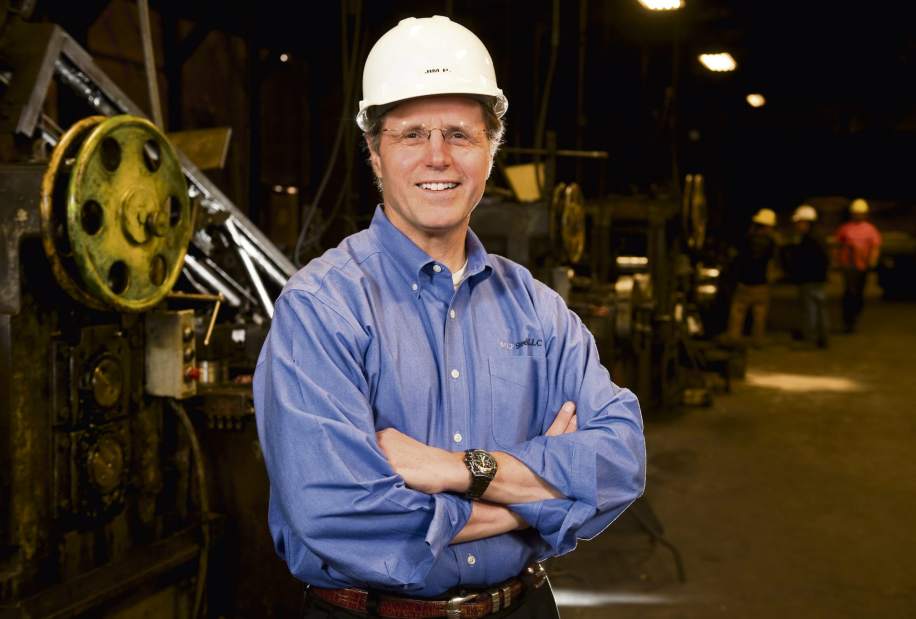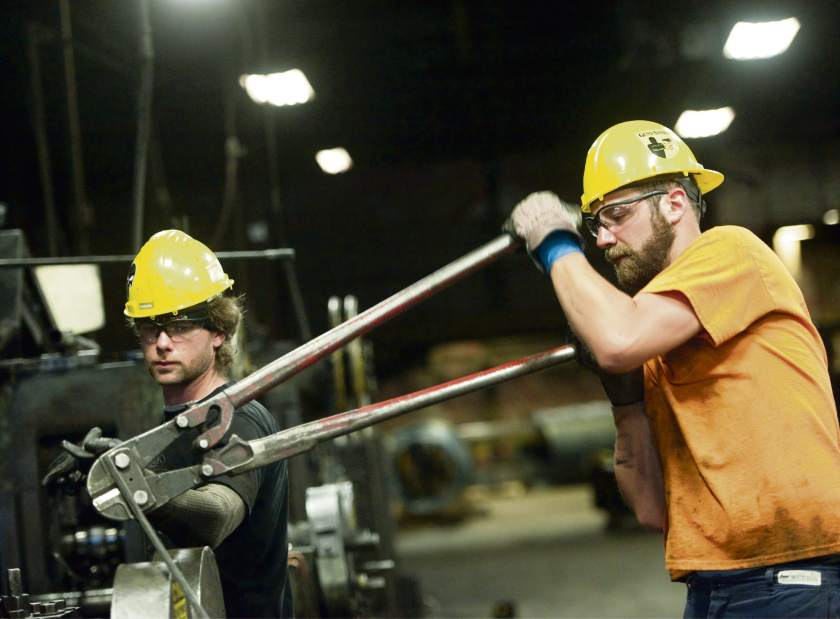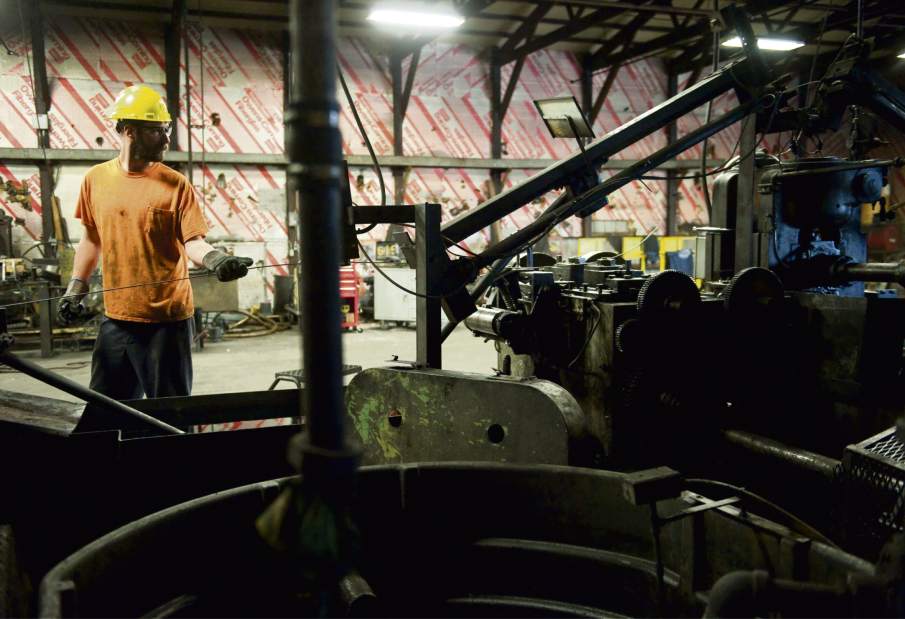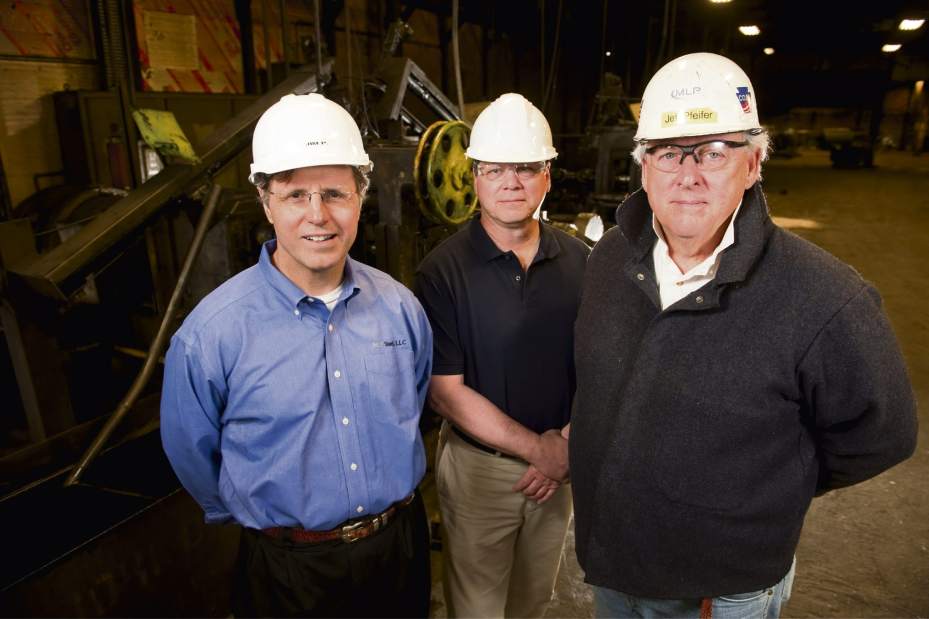Scottdale steelmaker soldiers on, hopes Trump can bring change to D.C.
Jim Philipkosky jokes that he bought his small specialty steel company in Scottdale “a day before the credit window closed” in January 2008.
Nine months later, the financial world fell apart.
Marwas Steel Co., which Philipkosky renamed MLP Steel, has bucked burdensome times for domestic steelmakers and kept its two nonunion plants operating. Its 80 employees make wire, rods and grating.
“We try to satisfy a niche,” said MLP Steel CEO Jeff Pfeifer of Ross. “That's where a lot of us are these days, because if it gets to be a big commodity product, then it will probably be taken over by the foreign imports.”
Despite engineering and business degrees from Columbia and Harvard, it isn't easy for Philipkosky, 54, to keep even a niche steel company alive. The challenges for a guy who grew up in tiny Long Branch, Washington County, and now lives in tony Weston, Mass., are many: unfavorable trade laws, global commodity pricing, low-cost Chinese competition, eroded U.S. manufacturing, and a shrinking pool of skilled workers.
So, unlikely as it may seem for the son of a Belle Vernon grocer from largely Democratic Western Pennsylvania, Philipkosky is among the Americans of all sorts who have jumped on Donald Trump's bandwagon.
Pfeifer, a longtime steelworker in his 60s who grew up in Millvale, jumped with him.
The reason is simple: They believe the Republican presidential candidate can change the business of government.
“We don't want to remember too much about Richard Nixon and his ‘Silent Majority,' ” said Philipkosky, “but I think there is an element of that out there right now.”
Republican political analyst Joe DiSarro found a diverse crowd waiting hours to see Trump during his April 13 visit to Pittsburgh.
“Is it that they are fed up with politics as usual, to use that cliché?” said DiSarro, a Washington & Jefferson College professor. “I'm not so sure.
“Trump has a way with people. He has charisma … and incredible name recognition. That is part of his success story. People see him and say, ‘You know, I wish I was Donald Trump.' ”
Economic measures
Most people don't talk about a disappearing middle class.
But many feel the effects of soaring U.S. debt — up 8.5 percent since 2008, to $18.9 trillion — and a gross domestic product that grew less than 2 percent in that time, to $16.5 trillion.
Philipkosky knows the numbers. He is incredulous that no one tries to correct the imbalance.
He wasn't always wealthy — hard work, bank loans and scholarships propelled him out of the Mon Valley where, like many small-town boys in the 1970s, he played football on Friday nights and worked at McDonald's.
From that modest start, he built a career as a venture capitalist, becoming one of the first investors in Dick's Sporting Goods. He co-founded a consulting firm specializing in IT systems and sold it to a Japanese company before buying MLP Steel.
“He came from another world,” said Pfeifer. “The steel industry is a world unto its own, unlike the venture capital business. ... I think Jim starts to appreciate a lot of the problems we've been confronted with for the last 30 years.”
Like Pfeifer, Philipkosky rails against free-trade agreements that allow Canada, Europe, Japan and other countries to tax American imports but give their own companies rebates on goods shipped to the United States.
“We always hear, ‘Small companies are the lifeblood of the United States.' ... It appears the multinationals who have the power to influence legislation are the ones who do well with free-trade agreements,” Philipkosky said.
“We go to Washington and we try to fight for trade,” Pfeifer said, and “there's so much money against us.”
He said he wonders where Hillary Clinton stands, in case the Democrat wins the White House.
“I know she's walking around, giving her speeches, talking mainly about the Bernie Sanders issues, trade being one of them,” Pfeifer said. “But she was never really one of our people in Washington that we could count on when it came to trade. She may be for us, or she may be against us — I just don't know.”
Costs add up
Neither Philipkosky nor Pfeifer agrees with everything Trump says, but they said his salesmanship might help him to accomplish things as president.
“I'm comfortable with our forefathers' separation of powers to prevent someone from doing something stupid,” Philipkosky said.
After years of lobbying for steel in Washington, Pfeifer said he thinks few politicians “know what we're talking about.”
He tries to illustrate some of the losses: good-paying U.S. jobs such as machinists who know trigonometry, geometry and programming; and entire industries such as electronics, textiles, machine makers, fabricators, tools, fasteners, even toys.
The cost extends to bankrupt cities: “If you add up these costs — the loss of brain power, of engineering, of your companies — and you're left with this incredible debt on your cities, it doesn't appear to me there was that much of a savings in exporting jobs,” Pfeifer said.
“The sad thing with Washington is, if they don't like an industry for whatever reason — and coal was a big one — they say, ‘Let's get rid of it.' That's not really the way you should approach it. For any problem, you say, ‘How can I make it work?' ”
He and Philipkosky are counting on Trump-the-officeholder to be a negotiator. Trump's occasional cringeworthy comments don't bother them.
Pfeifer said he is less troubled by Trump than by those already in Washington. “We fought a war we didn't have to fight, and we let the genie out of the bottle in the Mideast, and now we've got ISIS and everything else,” he said.
“Why should I be worried about Trump when these guys have gotten us in the situation we're in right now?”
Sandra Tolliver, a former deputy managing editor at the Tribune-Review, is a freelance writer from Upper St. Clair.




